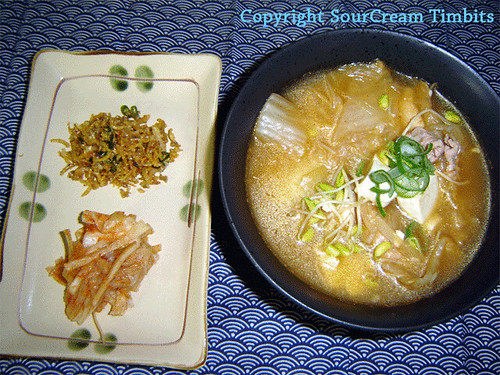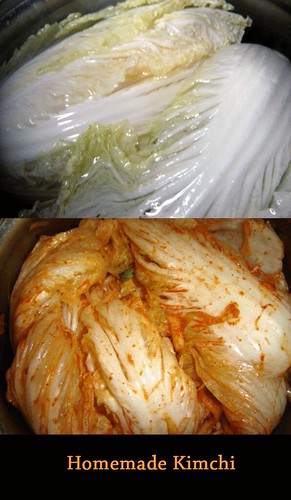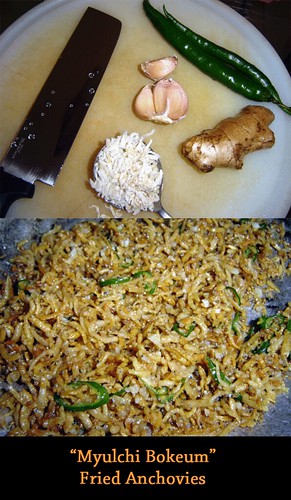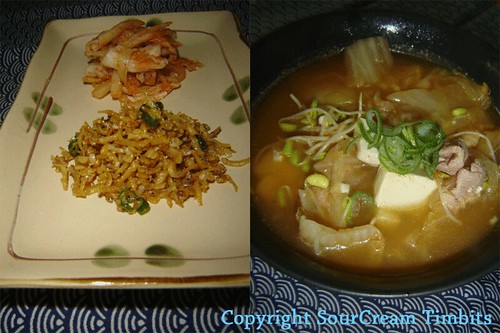My Korean Kitchen – Kimchi Jjigae and Myulchi Bokeum
Just some recipes I want to share with all of you from my recent cooking activity.
I’m not from Korean ancestry, yet I love Korean foods. Who doesn’t? Korean foods are nicely spiced with common ingredients and mostly flaming hot with the addition of “gochujang” [Korean chili paste]. I fell in love with Korean food while in
What I find interesting about Korean restaurants is that they always provide side dishes for free. The side dish commonly consists of kimchi, pickled veggies, anchovies, or whatever they happen to make that day. These side dishes are what distinguished Korean cuisine. In a bigger restaurant, you will get around ten side dishes and you’ll feel full before the main meal even arrives.
I’m also interested in Korean cooking. Mostly because of the influence from this wonderful Korean drama series “Dae Jang Geum” [Jewel in the Palace] which is about the journey of a palace girl [named Jang Geum] in the intricate world of Korean kingdom. This drama features a lot of Korean food, Korean cooking, Korean herbs, and many more. The preparation of Korean food was made really interesting that I made myself try to make some of the dishes.
After purchasing this Korean cookbook filled with authentic recipes, I soon started planning what to make. I decided to start from the basics. Making homemade kimchi, This kimchi would have later purpose, which is to make “Kimchi Jjigae” [kimchi stew] and to be served as a side dish.
One side dish is not enough, I decided to also make “Myulchi Bokeum” [fried anchovies]. Let’s see how the process evolves.
All recipes are courtesy of “The Food of Korea” published by Periplus Edition
Kimchi [Whole Cabbage Kimchi]
You need:
1 Chinese cabbage [napa], about 600 g
½ cup coarse or pickling salt
4 cups water
1 small long white radish [about 160 g], cut in 1 ½ -in julienne strips
1 spring onion, cut in 1 ½ -in julienne strips
1 small leek, white part only, cut in 1 ½ -in julienne strips
2 tsp garlic, very finely chopped
1 tsp ginger, finely grated
1 ½ - 2 Tbsp chili powder
5 g pickled shrimp [optional]
20 g salted anchovies [optional]
Let’s start!
Day 1
Trim off the root end of the cabbage, but do not cut or separate the leaves. Put all but 1 ½ tablespoons of the salt in a large bowl and add 4 cups water. Stir to dissolve, then add cabbage, bending the end if necessary to fit the cabbage in tightly. Put a weighted plate on top to keep the cabbage under salted water, and keep at room temperature for 12 hours or longer if needed until the cabbage has softened. Drain the cabbage, rinse well under running water, and squeeze dry.
Day 2
Combine all other ingredients in a bowl, tossing to mix well. Stand the cabbage upright in a bowl and separate the leaves, one by one, pushing in some of the radish mixture by hand to fill. Pack the cabbage, pushing it down firmly into a covered jar just large enough to hold it [you can also use a covered pot]. Press down to remove any pockets of air, then cover the jar.
Refrigerate 2 hours, then transfer jar to a warm place – around 78°F [25°C] for about 24 hours to ferment.
Day 3
Transfer to a fridge and chill. Chop before serving.
Never use a reactive metal container to store kimchi; use porcelain or stainless steel. Plastic will permanently be stained by chili. Store kimchi in a cool, dark place – fridge is the best.
Before getting to the main course, “Kimchi Jjigae”, let’s make another side dish because it’s not common to only serve one side dish. This is called “Myulchi Bokeum” and very simple to make. In the picture, you will see that my anchovies have turned brown [from bone white] after cooking in oil. However, the picture in the book shows the anchovies as transparent white after cooked. Those are what I found when shopping at Korean supermarket. The difference is probably caused by the different anchovies used. I have no idea what type of anchovies are commonly used by Koreans.
Myulchi Bokeum [Fried Anchovies]
You need:
80 g dried cleaned anchovies [about 5 cm in length] or 100 g whole dried baby anchovies
2 in [5 cm] ginger
2 tsp water
3 Tbsp vegetable oil
2 tsp garlic, very finely chopped
2 tsp sugar
½ - 1 tsp crushed dried chili [optional; I used sliced, seeded green chili]
1 tsp sesame oil
1 tsp toasted sesame seeds, for garnishing
Let’s start!
If anchovies are not purchased cleaned, discard the heads and the dark intestinal tract. Do not wash the anchovies.
Put the ginger and water in a spice grinder and blend. Put in a sieve and press down to obtain 1 teaspoon ginger juice. Set aside. [I simply grated the ginger, blended it with water and pressed it down the sieve]
Heat the oil in a wok and add the anchovies. Stir-fry over medium heat until crisp and cooked, 5 minutes. Remove anchovies from wok and drain on paper towel. Clean the wok and return to the heat. Add anchovies and sprinkle with ginger juice, garlic, sugar and stir-fry 1 minute. Add chili and sesame oil and stir-fry for a few seconds, then mix well. Transfer to a serving dish, garnish with toasted sesame seeds, and serve at room temperature. This will keep in the fridge for one week.
We’ve come to the main attraction of this first entry for My Korean Kitchen. After I think about it, I’ve only heard of this dish so many times but never really tried it. I guess I was just too hooked on “Gam Ja Tang” [pork bone soup]. As I expected, this soup is hot and sour, very refreshing to the taste buds. It is recommended that you make your own beef stock [recipe follows] instead of buying the packaged ones from the grocery or using bouillon cubes. The stock really adds depth to the soup, making it a very satisfying one to eat.
Kimchi Jjigae
You need:
1 Tbsp vegetable oil
120 g beef sirloin, finely shredded [can be replaced by pork]
1 -2 tsp garlic, smashed and very finely chopped
2 ¼ cups firmly packed [480 g] sliced kimchi
6 cups [1 ½ liters] Beef Stock
120 g bean curd, sliced into rectangles about 3 cm by 2 cm
1 – 2 tsp chili powder
2 spring onions, thinly sliced
1 small red or green chili, sliced
Let’s start!
Heat the oil in a cast iron pot [any pot will do if you don’t have one] and stir-fry the beed until it changes color. Add the garlic and kimchi and stir-fry for a couple of minutes, then add the Beef Stock. Bring to a boil and simmer 1 minute. Add the bean curd and chili powder, return to a boil, and simmer 2 minutes.
Serve into individual bowls. Sprinkle with spring onions and sliced chilies and serve hot.
Hint: One cup of the beef stock can be substituted with juice drained from kimchi jar.
Arrange everything as suggested in the first picture of this entry. The whole process may seem laborious, but it’s nothing when you got plenty of time in your hands ^^
Enjoy with a bowl of steamed short-grain rice [e.g. Nishiki brand].
Beef Stock
You need:
2 lb [1kg] shin beef, in one piece
8 cups [2 liters] water
Let’s start!
Put beef in a pan with water and bring to a boil. Simmer 10 minutes, then skim off all the material that has risen to the top of the liquid. Cover the pan, lower the heat and simmer very gently for 1 ½ hours. Strain stock and use beef for some other purpose.








13 Comments:
Hi Strawberry,
The Kimchi looks fantastic, I have been looking for a recipe for some time, and here it is! Looks delicious, was it as pedas as it looks?
The Myulchi Bokeum looks just like Indonesian Teri Goreng, minus the kacang of course, is the taste similar?
I have linked to your blog from mine, I hope you don't mind but your food choices look Sooooooo Good!!
Ceendy, wow! You really have done yourself proud with this 3 in 1 post!
The kimchi lools awesome and so does the soup [sorry can't remember what you called it]. Oh, and i wish i was there to try all these creations - even the fried anchovies! Everything looks so drool-worthy :)
Thanks for the recipes!
Hi Richard,
Thank you for linking my blog from yours.
The kimchi that I made was not that "pedas", but as kimchi should taste, it was salty and sour. The taste of pickled vegetable. It wasn't so spicy due to the wrong choice of chili powder perhaps =p The whole process was really fun for me!
s for the "teri goreng", it's different from Indonesian one bc it's sweet and refreshing from the aromatic ginger juice.
Hey Mae!
Finally you're back after MIA [missing in action] for a while.
I hope you'll share your own creation of these recipes... :)
I am really looking forward to making the Kimchi when I get home, It looks so simple yet so delish!
Hello. I've made some good batches of kimchi. I'd like to know how long kimchi can last for in the refrigerator? A good batch I made has been neglected for many months.. is it still good to eat?
best,
michael
mikedmb13@aol.com
www.myspace.com/rawsoccerdude
I really should try to make this as I have been wanting to taste nice kimchi after buying a premade one at an Asian grocery store which smelled like something dead and tasted like a rotten cabbage covered with paprika. Needless to say it turned me right off Kimchi. It's a shame as I have never tried it again...
thanks 4 sharing with us
good post thanks
awesome post thanks
Korean food are so delicious. its really helpful for me because i am also learn to make korean food.
restaurant gutscheinbuch
Her much information visit here to add insight to me then give useful for everyone. a visit back in jual jaket kulit asli ...thank you
https://www.quester.pk/question/does-ufone-have-3g-coverage-in-bara/
https://www.quester.pk/question/does-ufone-have-3g-coverage-in-balakot/
https://www.quester.pk/question/does-ufone-have-3g-coverage-in-bajur/
https://www.quester.pk/question/does-ufone-have-3g-coverage-in-bahawalpur/
The post is very greate and information is also usefull.
glass manufacturing companies in bangalore | safety glass manufacturers in bangalore
Post a Comment
<< Home